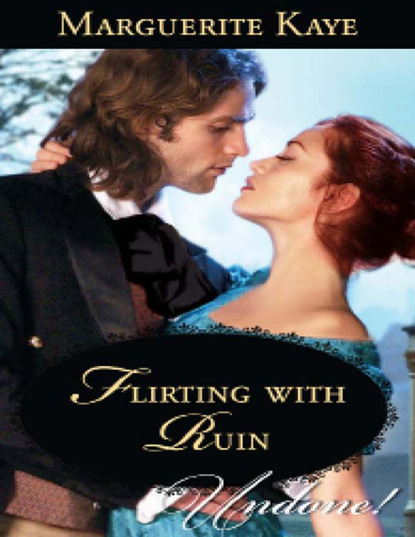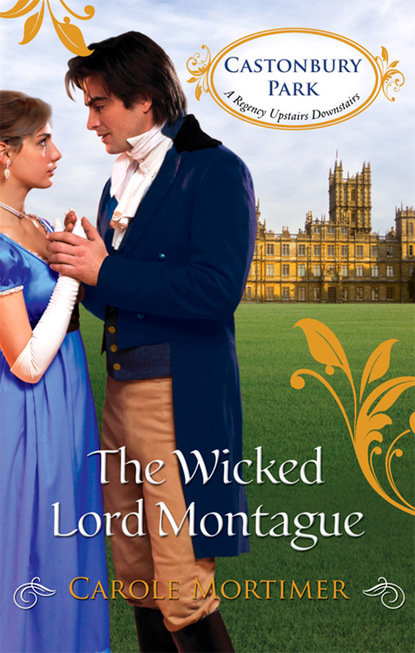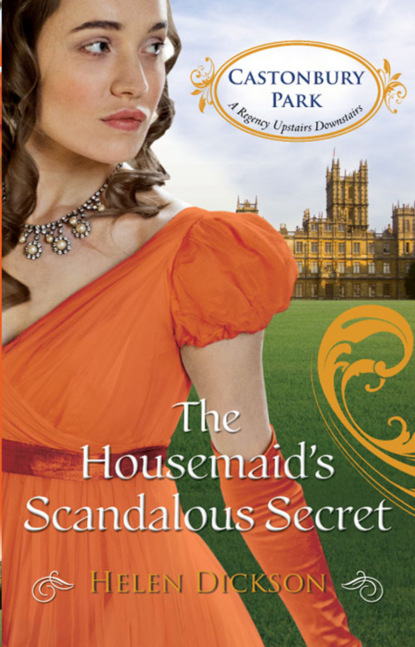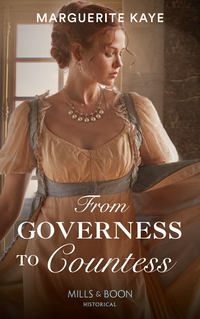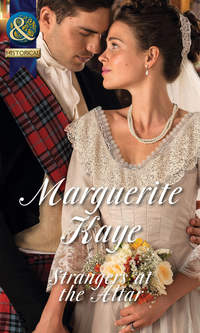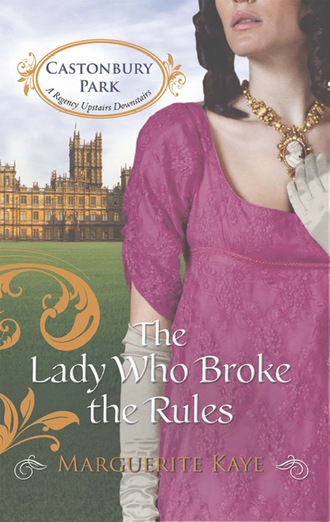
Полная версия
The Lady Who Broke the Rules

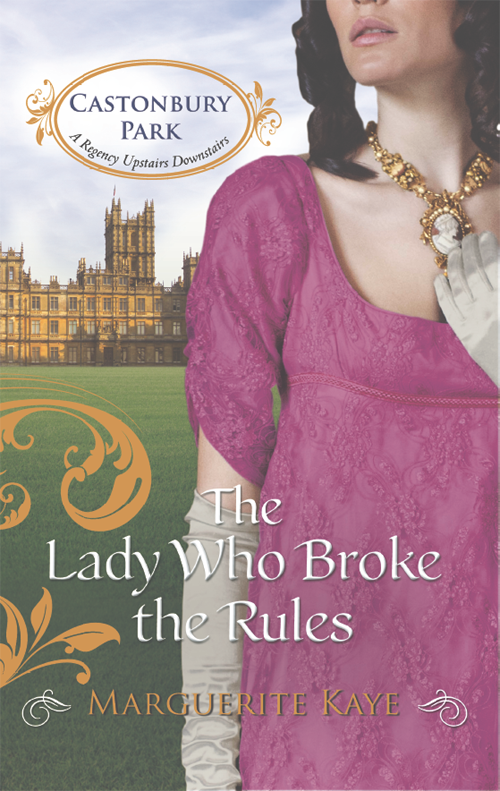

Survival of the fittest is fine, so long as you’re the one on top … but the family that has everything is about to lose it all …
The Montagues have found themselves at the centre of the ton’s rumour mill, with lords and ladies alike claiming the family is not what it used to be.
The mysterious death of the heir to the Dukedom, and the arrival of an unknown woman claiming he fathered her son, is only the tip of the iceberg in a family where scandal upstairs and downstairs threatens the very foundations of their once powerful and revered dynasty …
August 2012
THE WICKED LORD MONTAGUE – Carole Mortimer
September 2012
THE HOUSEMAID’S SCANDALOUS SECRET – Helen Dickson
October 2012
THE LADY WHO BROKE THE RULES – Marguerite Kaye
November 2012
LADY OF SHAME – Ann Lethbridge
December 2012
THE ILLEGITIMATE MONTAGUE – Sarah Mallory
January 2013
UNBEFITTING A LADY – Bronwyn Scott
February 2013
REDEMPTION OF A FALLEN WOMAN – Joanna Fulford
March 2013
A STRANGER AT CASTONBURY – Amanda McCabe
Duke of Rothermere
Castonbury Park
Darling Kate,
I know you have had a turbulent time of late and that being part of the Montague family comes with its own pressures. Still, it is good to have you home, where I hasten to say I can keep an eye on you. Daughter, your fiery nature and past misdemeanours have not gone unnoticed by me or the rest of the household. Still, your reputation can be salvaged—and I do hope you’ll take this time to find a most suitable husband.
Yours,
Father
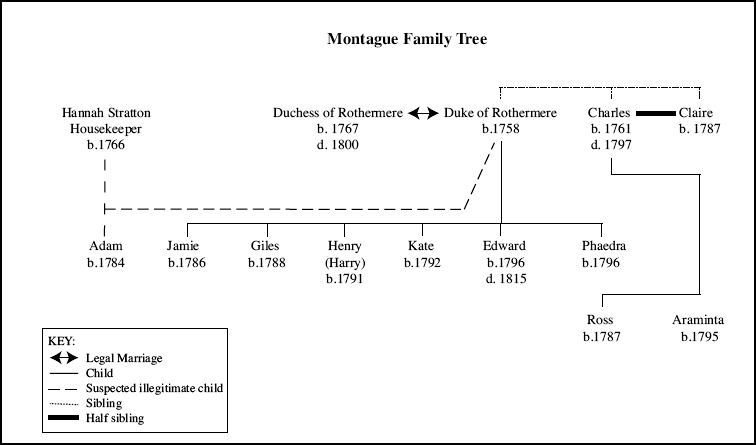
About the Author
Born and educated in Scotland, MARGUERITE KAYE originally qualified as a lawyer but chose not to practise. Instead, she carved out a career in IT and studied history part-time, gaining a first-class honours and a Master’s degree. A few decades after winning a children’s national poetry competition, she decided to pursue her lifelong ambition to write and submitted her first historical romance to Mills & Boon. They accepted it and she’s been writing ever since. You can contact Marguerite through her website at: www.margueritekaye.com
Previous novels by the same author:
THE WICKED LORD RASENBY
THE RAKE AND THE HEIRESS
^ INNOCENT IN THE SHEIKH’S HAREM
^ THE GOVERNESS AND THE SHEIKH
*THE HIGHLANDER’S REDEMPTION
*THE HIGHLANDER’S RETURN
RAKE WITH A FROZEN HEART
And in Mills & Boon® Historical Undone! eBooks:
THE CAPTAIN’S WICKED WAGER
THE HIGHLANDER AND THE SEA SIREN
BITTEN BY DESIRE
TEMPTATION IS THE NIGHT
+ CLAIMED BY THE WOLF PRINCE
+ BOUND TO THE WOLF PRINCE
+ THE HIGHLANDER AND THE WOLF PRINCESS
^ THE SHEIKH’S IMPETUOUS LOVE-SLAVE
SPELLBOUND & SEDUCED
^ linked by character
* Highland Brides
+ Legend of the Faol
AUTHOR NOTE
The history of slavery has fascinated me. It’s a complex, emotive and often controversial subject and no one except those who experienced it can know what it was really like. In writing this book I did a lot of research, but ultimately what I’ve written is a personal take which may or may not resemble ‘reality’. What I want to share with you are some of my reasons for choosing to take on the challenge of making a freed slave a romantic hero in the first place.
The Lady Who Broke the Rules is set in 1816. In the United States the trade of slaves was abolished in the north in 1804, after which the manumission of slaves in those states gathered momentum. In the South, however, where cotton was in increasing demand (paradoxically thanks to the north’s industrialisation of textile manufacture), slaves were a hugely important part of the economy and resistance to abolition was significant.
Virgil, my hero, was born into slavery in the South and freed in the north. He was one of the fortunate ones who came to true eminence and used his wealth to give others the chances he had had to make for himself. Though in reality this kind of success was rare, it was not unheard of. Robert Purvis is just one example of the black philanthropists from whom I took inspiration for Virgil, but his entrepreneurial side is an amalgamation of a whole number of black men and women who flourished in nineteenth-century Boston, renting out real estate, setting up restaurants and beauty parlours, making shoes and clothes for the mass market, taking on the establishment by training as lawyers and doctors.
Across the pond in Great Britain many aristocratic families had derived a large part of their wealth from plantations in the West Indies which relied on slavery, but their influence was on the decline. The actual trade of slaves became illegal in 1807 and, although it was not until 1833 that slavery itself was abolished, by 1816 the growing Abolitionist movement, coupled with the decline of the economic significance of the West Indies plantations, made the idea, if not the reality, of slavery much less politically and socially acceptable than it had been a decade or so before.
From the point of view of this story, what interested me most about the British abolitionists was how many of them were women. It was one of the few political causes in which it became acceptable for women to participate and in which women took a leading and influential role, so I relished the opportunity to create a heroine who could, without it seeming a historical anachronism, be active politically and philanthropically. Josiah Wedgwood’s daughter, Sarah, who introduces Kate to Virgil, was just one real-life example I drew on.
There’s a huge difference between perception and reality. Kate had only read about slavery. Virgil had experienced it. As a writer, I had to try and imagine myself in both sets of shoes and whether I’ve managed it or not—well, that’s for you to decide. But ultimately this isn’t a book about slavery—it’s about love. And I hope you’ll agree that Kate, The Lady Who Broke the Rules, is as perfect for Virgil as I imagined her to be.
The
Lady Who Broke
the Rules
Marguerite Kaye

MILLS & BOON
Before you start reading, why not sign up?
Thank you for downloading this Mills & Boon book. If you want to hear about exclusive discounts, special offers and competitions, sign up to our email newsletter today!
SIGN ME UP!
Or simply visit
signup.millsandboon.co.uk
Mills & Boon emails are completely free to receive and you can unsubscribe at any time via the link in any email we send you.
To the strong women in my life, from my mother and sister to my friends and the authors who inspire and encourage me.
Annie
Prologue
Booth Plantation, Virginia, Fall 1805
It had been cold last night, the temperature dropping rapidly as dark fell. The initial pain of the whipping had passed. He was used to it, the searing heat of the lash as it ripped open his skin, the white-hot flashpoint as the salt water bit like acid into the open wounds, the sudden blackness which accompanied the soaking—which always accompanied it, no matter how hard he tried to remain conscious. Now the cycle of recovery would follow. He was inured to that, too, the throbbing which became a dull ache as his flesh began to heal, the stiffness in his shoulders and neck from holding himself upright.
Huddled into the corner of the tiny space of the cellar, Virgil was grateful for the cool air on the lacerations which crisscrossed his back. He must have leaned against the rough stone walls, for there was a raw pain tugging at the knitting flesh of his wounds this morning. It was almost impossible to avoid the walls in the confined space, which was not big enough for one his size to do anything other than crouch, not wide enough for him to lie down. He could only curl, foetus-like, on the hard-packed mud of the floor.
Tentatively, Virgil sought out the newly tender spot. His fingers came away wet. Unable to see anything in the pitch-black of what his fellow slaves called the hellhole, he sniffed. The iron tang of fresh blood reassured him. Once, when he was fifteen or sixteen, his wounds had become infected. He’d wondered, before then, whether death would be better than the life he was shackled to. No more after that, and now that there was Millie, what he wanted was not just any life but a better one.
Virgil winced, dropping his head onto his knees. He’d been so sure their strike would succeed this time. So damned certain! But even though the tobacco leaves ripened on the stalks, even though the clock was ticking mercilessly towards the arrival of the merchants’ ships, Master Booth had held strong and the rebellion had been broken. He’d thought they would hang him for it, but he’d been festering so long in the dungeon now that Virgil had concluded he would be sold instead.
If it were not for Millie, this would be a victory of sorts. What would she do without him? What would he do without her? The sweet, tender moments they shared were what kept him going. Lying together under the stars in the blissful aftermath of lovemaking, they wove their dreams. His insurrection hadn’t come close to making them real.
Guilt, an agony much worse than any whipping, racked Virgil’s soul and wrung his heart. Millie was everything to him. Everything! He clenched his fists tight, making the cords of his sinews stand out. He would keep their dreams alive. He would make them happen and that would be his revenge. The time for trying to right the system which kept them all in chains from within was over. Master Booth and his like would never bend. No point in bloodthirsty plans for taking revenge on them either, for bloodshed only led to more bloodshed. He would have his revenge, he would triumph over them all, and he would make his dreams happen, not by physical force but by force of will. His will. He was better than them. He was stronger. He would show them, he would prove to them all that he could be better, and he would do it on his terms. He would win his freedom. He would win their freedom, his and Millie’s. He could read and write. He knew himself smart, for he’d seen that look, fear and confusion, on Master Booth’s face when he’d presented his case before the strike. And he could work. He could certainly work. No one could work as hard as he. The interminable hours he’d worked for the larger part of his nineteen years on earth had honed his body into a powerful machine.
They’d most likely sell him in one of the northern markets, for everyone in Richmond would know him for a troublemaker. If he hit lucky, his new master would be a liberal. It was of no import. He would triumph, and no matter where he was sent to, no matter how long it took, he would win. Then he would come back for Millie. He would make sure and tell her that somehow, though she’d know—she knew him enough not to doubt that, surely? He’d come back for her. He’d tell her so. She just had to keep herself safe until then.
Deep in thought, he hadn’t noticed the tiny fingers of light slanting through the hatch of the cellar. Only as the key grated in the trapdoor lock did Virgil realise they had come for him. He braced himself for the pain as he unfurled his large frame, shading his eyes against the light, taking his first stumbling step in five days.
The plantation square was headed by the master’s residence, the other three sides formed by the huge drying rooms which housed the newly harvested tobacco leaves. His fellow slaves filled the space. As his eyes became accustomed to the light, fear made Virgil’s skin clammy. All of them, field workers and indoor servants, were there in ranks. In front of the whipping post stood Master Booth himself. Was he to be beaten again? Anxiously, he scanned the row of house servants, looking for Millie, but she wasn’t there. Fear turned to dread. The sweet, rotten smell of drying tobacco was overlaid with the sharp, tangy scent of sweat. He saw his dread reflected in the faces of his fellow slaves. A terrible premonition made him stand stock-still. Only a sharp nudge from one of the white servants urged him forward, the manacles on his ankles clanking, to stand in front of the master.
‘You will be sold,’ Master Booth said in that peculiar drawl which still held the faintest traces of his English ancestry. Beads of sweat dripped down his ruddy cheeks. His brown tied wig sat at its usual odd angle. ‘I will not tolerate insubordination. It is time you learned your place in life, boy.’
Virgil straightened his shoulders and threw back his head, meeting Booth’s gaze full-on. ‘There is nothing you can teach me about my place in life,’ he said, his voice raspy from lack of water.
In the past, such defiance had angered Booth. Today, he smiled. It was this which tightened the knot in Virgil’s stomach. Following the direction of the master’s gaze, he was aware of that smile broadening. His knees threatened to buckle as his stunned mind absorbed what he was seeing. Millie. Her hands tied with rope. Her eyes fastened on him. Pleading. Terrified. And beside her, Harlow. The overseer.
Virgil lunged, but the white men holding him strengthened their grip. Even so, he had all but escaped when his manacles were yanked, dropping him to his knees. Millie was crying now, loud, racking sobs that pierced his heart. Not this. Not Millie. Not this. The pride which had kept him silent all his life meant nothing in the face of this new horror. ‘Please,’ he yelled to Booth, ‘please.’
But the master simply scowled. ‘Too late.’ He nodded at his overseer. Millie was struggling desperately. Regina, the cook, took a step towards her, but she was pulled away by one of the housemaids. They all knew from bitter experience that interference would only result in a more brutal assault. Virgil knew it, too, but it made no difference. He continued to struggle, his muscles straining with every last ounce of their power to free himself, to reach her.
He called her name over and over. Their eyes met across the dusty courtyard. The overseer readied himself, unbuttoning his breeches. His white buttocks would have looked absurd under any other circumstances. Millie screamed. One almighty surge of energy and Virgil was back on his feet.
The two blows fell at once.
The overseer smacked Millie hard across the mouth. Silenced but still conscious, she fell onto her back and Harlow made short work of rucking up her brown sackcloth skirts.
The cosh hit Virgil hard across the back of the head. He fell, his face biting into the hot dust, into an oblivion denied Millie as the overseer set about the brief and brutal business of punishing her for her lover’s crimes.
Chapter One
Maer Hall, Staffordshire, 1816
‘Kate! So glad you could make it.’ Sarah Wedgwood pushed her way through the crowd to greet her friend. ‘I was afraid you were still in the Lake District.’
Lady Katherine Montague grimaced. ‘No, I returned a couple of weeks ago, just in time for my cousin Araminta’s wedding.’
‘I heard that your other cousin, Ross, ran off with a ladies’ maid,’ Sarah said sotto voce, eyes agog as she led Kate to a quiet corner of the room. ‘Surely that cannot be true?’
‘We don’t actually know what happened. When my Aunt Wilhelmina discovered that Ross’s intentions towards the girl were honourable, she rather lost the rag with the poor soul and sent her packing. Ross was furious —he headed hotfoot after her, and frankly we have no idea where they are now. Wherever it is, I do most sincerely hope they are married, for it seemed to me that Ross was quite besotted, and of course,’ Kate said with a mischievous smile, ‘to discover that her meddling has had the exact opposite effect of what she intended will make my dear aunt furious. She can talk of nothing but nourishing vipers in her bosom, and my father—actually, I’m not sure that Papa takes in anything much these days, since Edward and Jamie …’
Kate broke off, the familiar lump in her throat preventing her from continuing. Though it had been more than a year since Ned died at Waterloo, longer since Jamie had disappeared, the loss of her brothers still felt unreal. Both were buried in the distant lands where they fell. She wondered sometimes if that was it—with nothing to mark their passing, she could believe that they were still abroad, fighting. At times, she could wholly understand her father’s desire to live in the past. Though Jamie had always been too much the duke-in-waiting for her to do anything other than spar with him, she had loved Ned.
‘Sorry,’ she said to Sarah. ‘Things at home have become rather horribly complicated. I won’t bore you with the details, but suffice to say that your invitation for tonight was most welcome, though my aunt was furious at my accepting it. But I could not deny myself such an opportunity. Where is your guest of honour, I do not see him here?’
‘That is my fault, I fear,’ Josiah Wedgwood, son of the famous potter and the owner of Maer Hall, interrupted. ‘Mr Jackson was with me at the Etruria works, and I did not notice the time. He is changing for dinner, but he should not be long. How are you, Lady Katherine? It is very good to see you.’ Josiah bent low over Kate’s hand. ‘Our Mr Jackson made his fortune in American stoneware, you know, and we plan to do some business together, but I will not bore you with the details, my dear. Tell me how the duke does?’
‘Bearing up. He sends his regards,’ Kate said, a barefaced lie, for her ailing father was not even aware that she was here in Staffordshire, and would never have thought of sending his regards to a man he would consider to be a tradesman. ‘Never mind Papa, tell me about Mr Jackson. I cannot tell you how excited I am about meeting him. What is he like?’
‘See for yourself,’ Sarah replied, nudging her arm in a most unladylike manner. ‘Here he is now.’
As the double doors at the end of the Great Hall were closed by the Wedgwoods’ head footman, a ripple of excitement fluttered through the assembled guests. All eyes turned towards the man making his way down the room. Whispers, like the ruffle of a spring breeze playing on new leaves, rose to a murmur of anticipation. Silks rustled as the ladies of the company vied surreptitiously to be the first to greet him. Gentlemen edged closer to their host with the same intention.
The focus of all this attention seemed oblivious. He was tall, which was the first thing which struck Kate. And he was exceedingly well-built too, with muscles straining at the cloth of his coat, though he carried himself with the grace of a predator. There was about him something fierce, an aura of power, of sheer masculine force which should have repelled her but which Kate recognised, with a frisson of awareness, was actually fatally attractive. In every sense, Mr Jackson was different from any man she had ever met.
As his host stepped forward to greet him, Virgil Jackson resisted the urge to pull his coat more closely around him. A huge fire blazed at the end of the long gallery, but the heat it emitted radiated out to a distance of a few feet only, before disappearing into the chilly air. The copious renovations which Josiah had explained to him in detail during the tour of the hall the day before had not extended to this great gallery, which was part of the original Jacobean building. Despite the tapestries and hangings, a permanent breeze seemed to flutter around the cavernous space. The English didn’t seem to notice the cold, however. The ladies were all bare-shouldered, the rich silks and lace of their evening gowns low-cut, showing an expanse of bosom that in Boston would have been deemed shocking.
The starched collar of his shirt was chafing Virgil’s neck. The gathering, which his host had described to him earlier as ‘a few choice friends,’ seemed to consist of at least thirty people dressed in their finest. He smiled and made his bow to a stream of faces it was not worth his while remembering, relieved that he’d had the sense to visit a London tailor upon arriving in England.
Though he had nothing to be ashamed of in the quality of his Boston-made clothes, there was no denying that they were behind the times compared to English fashions. The dark blue superfine tailcoat he wore tonight was fitted so tightly across his shoulders and chest that it was frankly a struggle to put on, but the tailor had assured him that this was how it should be. His knitted grey pantaloons seemed indecently tight, and a far stretch from the formal black silk breeches and stockings worn on such an occasion back home, but the valet he’d hired—much against his own inclinations—had assured him that in the country evening dress was reserved for balls. The man had been right. He had been damned finicky, fussing over the perfect placing of a pearl pin in the cravat Virgil had been forced to allow him to tie after his own third attempt ended in a crumpled heap with the others, but he’d been right, and though it irked him that it should be so, Virgil was grateful for this small mercy. In attire, at least, he was the same as every other male guest in the room.
Of course, in virtually every other sense he was quite different. Virgil suppressed a sigh. He was grateful for the effort that Josiah and his wife had made to welcome him into their home, but with business concluded, he would much rather have avoided this soirée and the collection of influential people Josiah had invited for the sole purpose of demonstrating their support for what they perceived to be a shared cause. So many variations of that famous abolitionist medallion created by Josiah’s father were being brandished under his nose—the manacled slave cast in gold and silver worn as a bracelet, a necklace, a fob or a hair ornament—that he could be in no doubt of their goodwill. But the people of Old England were as ignorant of one salient fact as those in New England. It was one thing to cut the chains of slavery, quite another to be free. No one in this room knew that better than he.
He was the only black person at the gathering. Since leaving London, Virgil felt as if he was the only black man in England. Being so distinctively different nibbled away at the edges of his hard-earned confidence. He felt as if he were constantly teetering on the precipice of some irrecoverable faux pas, for though his success made him accustomed to mix with the highest of Boston society, and the people in this room were rather politicians and businessmen than aristocrats, the rules seemed to be quite different. It was disconcerting, though he was damned if he’d allow anyone to see he found it so!
‘Virgil, I would like you to meet our most esteemed neighbour and my sister Sarah’s dear friend.’
‘Surely not most esteemed, Josiah. That honour must go first to my father, and I have four older brothers who—I mean, two. I have just two older brothers now.’


